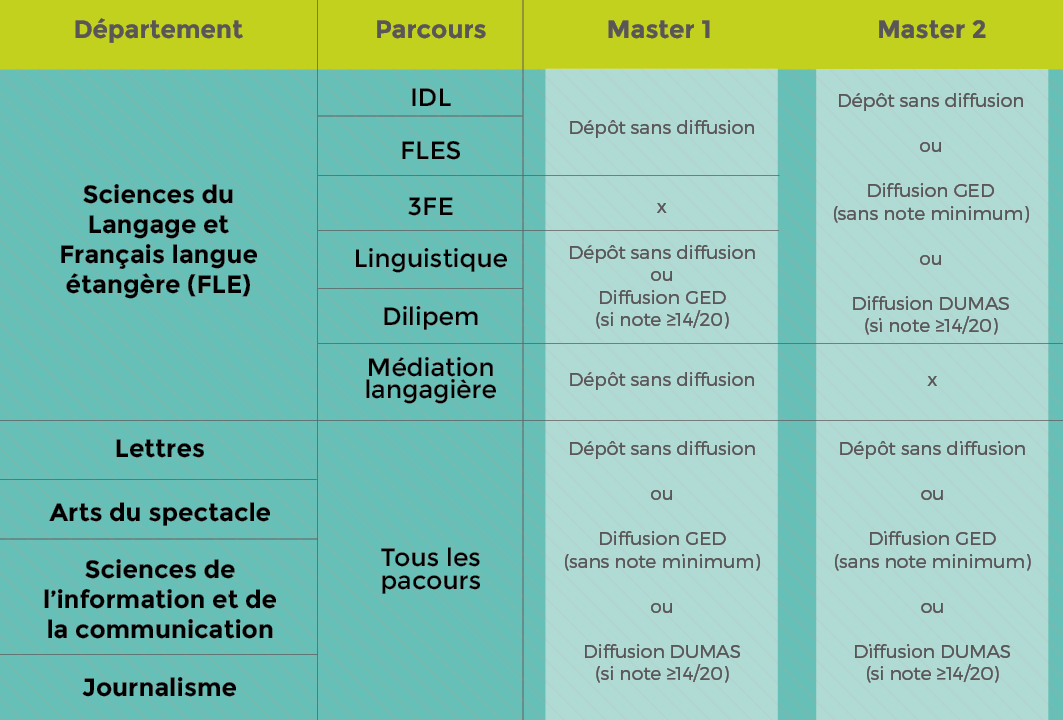Formatting the brief
A
brief template is available to help you format and enter your brief. This template sets out the structure to be followed and summarizes the information that must be included in your dissertation.
This model is common to all LLASIC courses, so you should also refer to the recommendations given by your dissertation supervisor, for the particularities that depend on your discipline or course. These recommendations take precedence over the information contained in the dissertation template.
> More details on how to
format your dissertationSubmission of the brief
Performing Arts, Humanities, Latin and Greek Languages and Literatures, Language Sciences and French as a Foreign Language departments (except M1 FLES distance learning)
- to facilitate transmission to the jury
- for preservation by the UFR library, as an official examination document
You will need to provide a paper copy only if your supervisor or a member of the jury requests one.
The period during which you can submit your dissertation will be communicated to you by your course teachers.
> More details about
submitting your dissertationInformation and Communication, Journalism departments
Distributing the brief
The aim of dissemination is to enhance the value of student work by giving it greater access and visibility. Following the principle of open archives, free and unrestricted access to research documents enables other researchers or future researchers (or the general public) to consult your dissertation as input for their own research.
Distribution also contributes to the institutional memory of the university's components.
Distribution of your dissertation, unlike its deposit, is not compulsory. The possibility of distributing your dissertation is subject to several conditions:
- Depending on your level (M1 or M2) and career path, the possibilities are different.
- A minimum mark of 14/20 in the dissertation is required in certain cases.
Consult the table below to find out which case you are in:

- When you defend your thesis, you will fill in the "Authorization for electronic distribution of an academic work" form to authorize or not the distribution of your thesis.
- On the same document, your manager will give a positive or negative opinion on the distribution.
File for distribution
If the conditions have been met for your brief to be distributed, you will need to review its content, paying particular attention to :
- elements that are not free of rights, confidential, or that could infringe on privacy (images, screenshots, photographs, personal data, etc.): if the file contains such elements, they must be masked.
- the sources used: they must be systematically referenced
For Masters degrees in the Performing Arts, Humanities, Latin and Greek Languages and Literatures, Language Sciences and French as a Foreign Language departments (except M1 FLES distance learning), if the version submitted before the defense meets these conditions, you do not need to provide a new file. If you need to rework the content of your dissertation for distribution, you must send a corrected version to your UFR library within 3 months of the defense.
Check the appropriate box on the "Authorization for electronic distribution of a university work" form.
Distribution platforms
DUMAS (Dépôt Universitaire de Mémoires Après Soutenance) is an open archive portal for student work. The portal is managed at national level by the CNRS.
The content of DUMAS is searchable by search engines, making it easy to find. On the other hand, this implies great caution in the choice of data to be disseminated (see above: Files to be disseminated).
You are invited to consult the "Charter of respect for authors' rights and protection of personal data" and the user forms, in the "Download" section at the bottom of this page.
The ADADI service (Help with copyright and image rights) can also answer your questions on copyright, image rights, publishing rights, distribution rights, etc., relating to the publication of research work:
arsh-adadi@univ-grenoble-alpes.fr
The
GED (Gestion Électronique des Documents) is a database to which access is restricted to UGA members: only students and teachers of theUniversité Grenoble Alpes have access, after authentication. This EDM is hosted on Alfresco, the collaborative space for Grenoble's universities.
Refusal to distribute
If distribution is refused, the dissertation will be archived on an internal university server, but will not be available for consultation.
Copyright
Students enjoy full copyright on their dissertations, covering both moral and economic rights.
If a publishing house wishes to publish your dissertation, we urge you to exercise the utmost caution before signing up with them, and recommend that you seek advice from your research supervisor or your UFR library.


